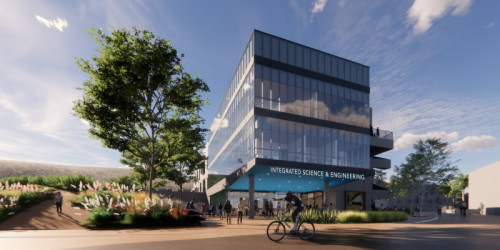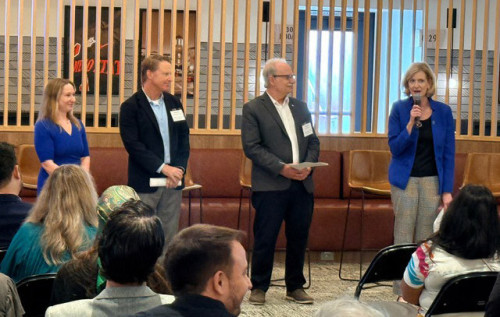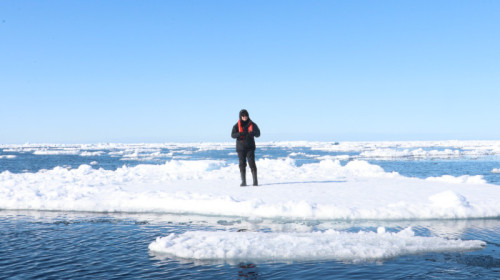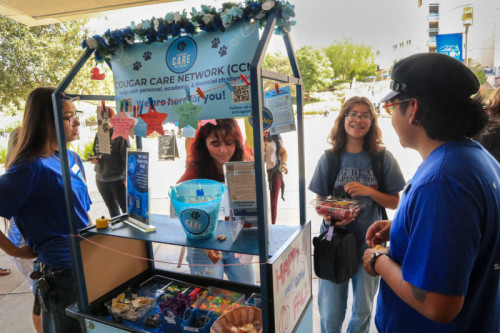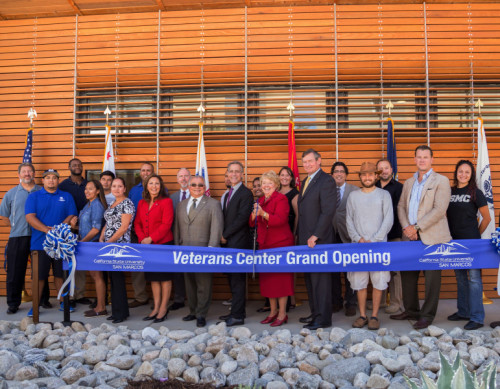Hunter Industries Gives Transformational $10M Donation for ISE Building
Cal State San Marcos is proud to announce a transformational $10 million philanthropic investment from Hunter Industries, one of the largest gifts in university history. The donation will support the construction of CSUSM’s new Integrated Science and Engineering (ISE) Building, a cornerstone of the university’s commitment to preparing the next generation of engineers and scientists.
Pending approval by the California State University Board of Trustees, the ISE Building will be named in honor of Hunter Industries, a San Marcos-based leading global manufacturer of products for landscape irrigation and lighting, dispensing technologies, and custom manufacturing since 1981. Construction began with a groundbreaking in July, and the building is scheduled to open to students by fall 2027. It will be funded through a combination of CSU systemwide funding and external contributions.
The ISE Building is critical to meet the growing demand for STEM education in San Diego County and Southern California, where regional industry needs have outpaced the production of qualified engineers and scientists. The building will allow the university to expand its enrollment of students in engineering disciplines from 500 to nearly 2,000.
CSUSM President Ellen Neufeldt revealed the donation on Friday, the same day that the university publicly announced its $200 million “Blueprint for the Future” campaign, the most ambitious fundraising effort in its history.
“This gift represents an extraordinary investment in the future of our region,” Neufeldt said. “Hunter Industries has been part of CSUSM’s story since our very beginning, growing as we grew, believing in our mission and sharing a vision for the future. I truly cannot imagine a better partner to walk alongside us in this next chapter. This will have such a great impact for our campus and region – opening doors to higher education and preparing the next generation of highly skilled engineers and scientists.”
“An educated workforce is the foundation of a thriving economy,” said Greg Hunter, CEO of Hunter Industries. “We are proud to deepen our partnership with CSUSM and invest in a facility that will empower students, strengthen our community and drive innovation for decades to come.”
Long a visionary philanthropic partner of CSUSM, Hunter Industries is included on the campus founder's seal listing original donors from the school’s early years. The company has supported CSUSM through pivotal growth projects, including capital and programmatic contributions toward areas such as the College of Business Administration, University Student Union and the Clarke Field House.
Hunter Industries has championed CSUSM’s STEM programs, contributing to the creation of the Hunter Design Lab in the Viasat Engineering Pavilion, funding state-of-the-art physics laboratories and providing internships, mentorship and faculty support through its software development division. Today, Hunter is a model of corporate partnership in higher education and the largest private employer in San Marcos, employing many CSUSM alumni and interns.
With Hunter Industries’ gift, CSUSM’s “Blueprint for the Future” campaign is more than 70% of the way toward the $200 million goal. The campaign’s theme reflects both the physical growth on campus and the forward momentum building at CSUSM as one of the CSU system’s fastest-growing campuses. Founded in 1989, CSUSM serves 17,000 students and is proud to be ranked in the top 1% nationally for advancing social mobility. To learn more about “Blueprint for the Future,” visit the campaign website.
About Hunter Industries
Headquartered in San Marcos, Hunter Industries is a leading global manufacturer of products for landscape irrigation and lighting, dispensing technologies, and custom manufacturing. Founded in 1981, the family-owned company offers thousands of products, including a full range of water- and energy-efficient solutions for residential, commercial, municipal, agricultural and golf course applications. Hunter’s core mission remains unchanged: to deliver valued products and services backed by unwavering customer support. Learn more at hunter.global.
Latest News Release
- CSUSM Celebrates One-Year Anniversary for SD Cyber ClinicCal State San Marcos joined elected officials and industry leaders from the cybersecurity sector and higher education Wednesday in an event at Snapdragon Stadium to celebrate the first anniversary of the San Diego Cyber Clinic. Launched in summer 2024 by the Cyber Center of Excellence (CCOE), CSUSM, National University and San Diego State with support from Google’s Cybersecurity Clinics Fund and the Consortium of Cybersecurity Clinics, the clinic has quickly become a vital resource for the region – working to grow a skilled cyber workforce, increase digital security for all and serve as a model for regional collaboratives around the world. “Our students are protecting small businesses, nonprofits and critical infrastructure,” said CSUSM President Ellen Neufeldt, who spoke at the event. "They’re gaining real-world experience while making a real-world difference and contributing to our region's economic vitality." In its first year, the San Diego Cyber Clinic has supported more than 30 local businesses, 18 faculty members and 170 students by providing free cybersecurity services to the community while offering invaluable hands-on training to the next generation of cyber professionals. “The San Diego Cyber Clinic is thrilled to celebrate one year of advancing the cyber workforce while safeguarding small businesses and under-resourced organizations across our region,” said Lisa Easterly, president and CEO of CCOE. “CCOE is proud to partner with CSUSM, National University and SDSU to deliver a wide range of free cybersecurity services to the community – all made possible through support and mentorship from Google.org and the Consortium of Cybersecurity Clinics. Together, we’re training more students, bolstering more organizations and forging new partnerships to seed the talent pipeline and strengthen regional resiliency.” Joining Neufeldt as a CSUSM representative at the event Wednesday was Teresa Macklin, one of three directors of the San Diego Cyber Clinic and also director of the Cybersecurity Education Hub at CSUSM. The university offers two online cybersecurity-focused degrees: a Bachelor of Science in cybersecurity and a Master of Science in cybersecurity, both housed in the College of Science, Technology, Engineering and Mathematics. The latter degree is the first cybersecurity master's program in the region. There also are many cybersecurity-related courses within individual academic programs. Cybersecurity clinics at higher education institutions provide free digital security services to under-resourced organizations, similar to how law or medical schools offer free community clinics. The San Diego Cyber Clinic provides CSUSM, National University and SDSU students the opportunity to learn cybersecurity and AI skills in an effective, hands-on manner while simultaneously helping to protect vulnerable organizations and critical infrastructure – such as local small businesses, hospitals, schools and energy grids – from cyberattacks. According to the World Economic Forum's 2025 Global Risks Report, cyber insecurity remains one of the top 10 global risks over the next decade. There are nearly 514,000 open cybersecurity jobs available in the U.S, including 44,000 in California and 5,500 in the San Diego region, and demand for cyber professionals is projected to grow 32% by 2033. To ensure that communities, critical infrastructure and businesses across the U.S. are secure, there is a distinct need for a skilled, diverse and AI savvy cybersecurity workforce. The San Diego Cyber Clinic is the only multi-institution clinic in the Consortium of Cybersecurity Clinics with a nonprofit industry partner leading the charge, training students to service clients across the public and private sectors in the San Diego region. Through engagement of key industry, academic and government stakeholders, including the city-led San Diego Regional Cyber Lab, the San Diego Cyber Clinic aims to grow an inclusive cyber workforce, increase digital security for all and serve as a model for regional collaboratives. The San Diego Cyber Clinic is one of 15 new clinics that launched in 2024 at higher education institutions across the country, thanks to a collaboration from Google and the Consortium of Cybersecurity Clinics.
- Professor Blends Art, Science on Summer Trip to ArcticFor Judit Hersko, a two-week voyage to the Arctic Circle last summer was more than a bucket-list adventure. It was the continuation of a two-decade career turn toward venturing to – both physically and emotionally – some of the coldest, most remote places on Earth and exploring the fascinating ways that art and science intersect. Hersko, a longtime Cal State San Marcos professor who’s chair of the art, media and design (AMD) department, is back on campus this semester as she digests the discoveries she made on her summer sojourn to Svalbard, a Norwegian archipelago between mainland Norway and the North Pole. How far-flung is it? After traveling the 5,400 miles from San Diego to Oslo, you’re still about 1,300 miles from your destination. In Svalbard, Hersko boarded a sailing ship called the Rembrandt van Rijn (named for the famous Dutch painter) that was chartered by The Arctic Circle, an annual expeditionary residency program for artists and scientists from around the world. With 29 other people – a mix of visual artists, writers, composers and science communicators – Hersko sailed down the west coast of Svalbard before the ship left the land behind and pointed northwest into the thick ice of the Arctic Ocean. “That was really exciting because it was a real North Pole feeling,” Hersko said. “The captain discovered this really large chunk of ice that was 20 kilometers. We moored to it, and it was sort of like mooring to land, except it moved.” During her time at sea and on the ice, Hersko gathered material that she will use for her unique brand of artwork that she calls performance lectures. These are tightly timed presentations of narratives grounded in historical and scientific research that are accompanied by visual images, including the artworks that she creates – her specialties are sculpture and installation that also incorporate photography and collage. “I build complex narratives that are basically true to life, except that I weave in a fictitious character who helps hold the story together,” she said. It’s an approach to art that was born of Hersko’s early years at CSUSM, and a life-changing trip to the globe’s opposite pole. In 2003, when she was hired at CSUSM, she sent a letter to colleagues on the science faculty telling them that she was interested in collaborating on projects. One of the most enthusiastic responses came from Victoria Fabry, a biological sciences professor whose scholarly work explored the effects of ocean acidification. Hersko and Fabry teamed up on an exhibit titled “Shifting Baselines” that translated the scientist’s research into visual art (it proved so impactful that it has been exhibited multiple times nationally, most recently last year in the San Diego Central Library). In 2006, Fabry went on a scientific trip to Antarctica and she came back raving about it, urging Hersko to apply for a program that brought artists there. Hersko did just that two years later. On a completely funded expedition as part of the extremely competitive National Science Foundation Antarctic Artists and Writers grant program, she spent six weeks in Antarctica, where she watched penguins hatching at her feet, studied planktonic snails and assembled the research material that guided her work for many years, exhibitions, presentations and book chapters to come. Specifically, she crafted narratives that centered around a fictitious, unknown female explorer, Anna Schwartz, who travels to Antarctica disguised as a man on the 1939 expedition led by American naval officer Richard E. Byrd. Though her protagonist is invented, Hersko said, “my work builds on meticulous research, and I place her in real historical events. These layered stories present the complex history of science highlighting the absence of women from the narratives of exploration as well as science.” Hersko isn’t the only School of Arts faculty member who has been to the frigid poles on a research excursion. In 2023, AMD professor Lucy HG Solomon received a prestigious Fulbright scholarship and did part of her research on Svalbard, where she furthered her ongoing studies of microorganisms and how they connect to the world. Solomon’s experience in the Arctic, in turn, led to a rare opportunity for one of her students. Last year, she connected AMD student Leobardo Moreno Villanueva with an ecologist at a Svalbard university, and Villanueva worked with the scientist on a graphic design project in which he helped make technical signage describing the scientific equipment used for research in the Arctic. Villanueva, a former foster youth from Mexico for whom English is his third language, graduated from CSUSM last spring. “Designing for the far north was an unforgettable challenge that expanded my perspective on how art and science meet in unexpected places," Villanueva said. As for Hersko, she knows several people in the small circle of polar researchers who have traveled with The Arctic Circle program, but she could never find the right time until this year. On July 4, she landed in Longyearbyen, a small town known for coal mining (though the last mine closed a few days before her arrival) and its views of the Northern Lights. After a few days to acclimate, she boarded the Rembrandt van Rijn to begin the two-week voyage. Among the highlights of her time at sea was up-close viewings of two polar bears, the tragic sight (and thunderous sound) of ice falling from stunning glaciers, and the discovery of tiny flowers and lichens that she thinks she will incorporate into her next output of art that results from this latest trip of a lifetime. “When I get fascinated by something, often it turns out that things come together in a weird, magical way where it has relevance,” Hersko said. “It’s all still percolating, and I think it’s probably a story that I will develop in the next year.” Media Contact Brian Hiro, Communications Specialist bhiro@csusm.edu | Office: 760-750-7306
- Cougar Care Network Marks 10 Years as a Campus Hub for ConnectionBuilt on listening first and guiding without judgment, the Cougar Care Network enters its second decade as a trusted stop for students seeking practical help, community and a path forward. The Cougar Care Network (CCN) launched in fall 2015 as part of Cal State San Marcos’ Early Support Initiative within the Student Outreach and Referral (SOAR) program. Patty Diaz worked in Student Affairs and was the SOAR coordinator. Today, Diaz is the coordinator of CCN. “It’s an incredible feeling to witness something you’ve helped build flourish,” Diaz said. “I’m proud of what Cougar Care Network has become and the positive reputation it has gained among students, faculty and the entire campus community. Together we are making a real difference in the lives of students.” SOAR was the primary referral source for faculty teaching first-year and underserved students. It operated like a concierge: students visited the office, where they were routed to other campus support systems, such as counseling or academic services. In fall 2016, SOAR rebranded as part of CCN. Today, CCN is a trusted place for students to build community while at CSUSM. “It’s fantastic,” said Donna Davis, CCN director. “It’s wonderful that the university has embraced us so much. And students know enough about us to walk right in with anything on their minds, knowing they can get some help. So we are honored by that every day.” Davis joined CCN in 2022 and became the program's director in 2023. “This team, they care so deeply,” Davis said. “We have a very dedicated group of professionals here that are creative, energized and excited to help students. I am so beyond honored to work with this group, and that is what’s kept me here through it all.” As CCN has grown over the past decade, so has the number of students it serves. During the 2024 academic year, it managed 4,620 student cases, a 58% increase from the previous year, according to CCN. There were an average of 20 new cases each day, and students expressed appreciation for the ease of being able to drop into the office to get immediate help with their concerns. While CCN does not offer long-term therapy, a majority of the cases involve mental health. The staff can provide advice and resources for issues like day-to-day anxiety, the stress after failing a test, or the emotional rollercoaster of going through a breakup. The team also helps students take their first step toward visiting counseling services on campus. “We spend a lot of time walking beside students until they are ready to take that step,” Davis said. Visiting CCN is easy and accessible. Students can email or submit a referral form to schedule a visit, or drop in to Administrative Building 1200, Monday-Friday from 9 a.m. to 5 p.m. Professors can refer students and an assigned staff member will reach out to the student to check in and invite them to visit. “Once we connect with them, we’re always going to make that person feel as comfortable as they can,” Davis said. One way CCN helps students feel comfortable during their visits is by offering a treasure chest in the office. Filled with items like facial masks, notebooks, fidget toys and mugs, the treasure chest began as a form of staff appreciation and evolved into a fun activity for students to engage with during their visits. The treasure chest also offers students the opportunity to visit the office and become familiar with the staff while they’re still deciding if they’re ready to talk to someone. Another entry point is the Cougar Care Network cart, introduced in the fall of 2023. The cart is operated by service-learning students as an informal, peer-to-peer way for students to learn more about the program and build connections at CSUSM, so they know support is available. “We are students ourselves. We’re not faculty or staff,” said Fernando Vasquez Rendon, a fourth-year psychology major and service-learning student with CCN. “Knowing that we’re also students adds a sense of trust and relatability.” Vasquez Rendon said he understands why some students may feel nervous about approaching the cart, and encourages them to interact with it and see what it has to offer. He said students often express gratitude for the cart, those who work it, and the free items and resources it carries. “Please, come up to the cart. We’re always happy to chit-chat,” he said. “I’m always open and I really want students to know that I and the team are here to really listen and support.” “One of the best parts is seeing a student for the first time and their interaction with the cart. Those interactions are what make this role beautiful, and I think those moments are really important.” CCN also uses the cart as a tool to help students connect with the University Student Union centers. For example, Davis explained that for students curious about the Pride Center but hesitant to walk alone, the card serves as a bridge, as students might walk into the center when the cart is there. “We know that there needs to be this kindness movement right now,” Davis said. “We know students are isolated and lonely. And regardless of how much social media they have — and the people they can connect with online — they’re still feeling alone on the inside. So the cart was started as a way to go over to students who are sitting alone and introduce them to the cart, because sometimes that’s the only person that student may talk to all day.” Lizet Palestina, another service-learning student with the CCN and a criminology major in her final semester, shared how she uses the cart to start conversations with students sitting alone. “I think it’s easier for students to talk to us, rather than a staff member,” Palestina said. Once the conversation is underway, Palestina and other service-learning students take the opportunity to inform students about campus resources, such as the CCN, Student Health and Counseling Services (SHCS), the Cougar Pantry and workshops. “There are a lot of students who are by themselves, and sometimes they’ll be nervous. But once you get the conversation going, they’re a lot more open,” she said. “It’s as simple as asking if they want a little duck, and then you keep the conversation going.” The mini ducks are one of the main reasons students approach the cart. Vasquez Rendon said it's common to see students visiting the cart to add more ducks to their collection. The ducks serve as a small symbol to remind students that they’re not alone. “Put it in your pocket, keep it in your book bag. But take it out and physically hold onto it as a reminder that we believe in you and know that you got this,” Davis said. Along with the standard mini ducks, CCN also releases special edition ducks for campus events. During a Commuter Breakfast event, the cart featured ducks in cars. In a previous collaboration with SHCS, a duck in a fry basket was offered in reference to the F.R.I.E.S. program on consent. F.R.I.E.S. describes consent as something freely given, reversible, Informed, enthusiastic and specific. CCN also rotates the cart's theme and available items based on cultural events and student feedback. Vasquez Rendon shared that the team is working to update the cart's theme for Dia de los Muertos and to provide cultural information about the holiday. “The cart is always changing as the student population changes,” he said. “I want students to know that the conversations we have don’t fall on deaf ears. If they bring up questions, comments or concerns, I always relay it back to the team.” Alongside the service-learning students, CCN also has a staff of Master of Social Work (MSW) interns who provide support to students. Vasquez Rendon plans to apply to the MSW program for the fall 2026 cohort. Davis shared that community donations and grant funding are crucial to ensuring that CCN can provide students the support they need. CCN is a part of the university's Community of Care program, an intentionally connected network to support students that was made possible by a generous grant from the Conrad Prebys Foundation. CCN also received philanthropic funding from a San Diego Foundation mental and behavioral health-focused grant to be able to staff MSW interns. “We’ve been very blessed with the grants, and they allow our MSW interns to dedicate their full attention to the students," Davis said. Community donations often help stock the treasure chest at the Cougar Care Network office. Davis said they are always welcoming new or gently used physical donations and added that students donate items like candles, facial masks and other small gifts they no longer need. Ten years in, CCN remains focused on simple ideas that matter, starting with a warm welcome and practical help that arrives when students need it. The aim is to walk beside each person until the next step feels possible and the path forward is clear. “We’re here to walk beside you,” Davis said. “And if you’re not ready today, no worries. Maybe you’ll chat with somebody at the cart or follow us on Instagram. Just in case you need us, we’re here.” Media Contact Eric Breier, Interim Assistant Director of Editorial and External Affairs ebreier@csusm.edu | Office: 760-750-7314
- In Memoriam: Josh Pack (’97), a Life of Leadership, Generosity and HeartCal State San Marcos is mourning the passing of distinguished alumnus Joshua Pack ('97), who died on Sept. 29. A devoted husband and father, proud Cougar, and tireless advocate for veterans and students, Pack leaves behind a legacy defined not only by professional success but also by kindness, humility and a deep commitment to helping others. Pack’s path to CSUSM wasn’t straightforward. After beginning his higher-education journey at the U.S. Air Force Academy and transferring to another university, he eventually found his home at San Marcos, where he earned a bachelor’s degree in economics in 1997. He often credited a CSUSM economics professor with transforming his academic trajectory and helping set the foundation for his career. Professionally, Pack rose to become co-CEO of Fortress Investment Group, one of the world’s leading investment firms. Over more than two decades, he built a reputation as a leader in credit and real estate investing, overseeing billions of dollars in assets and guiding teams through complex financial markets. Pack’s connection to CSUSM remained strong long after graduation. He gave his time and expertise as a member of the CSUSM Foundation Board from 2011-16, including service on the Fundraising Committee, where his vision helped strengthen the university’s philanthropic efforts. He also supported the Finance Society by offering real-world insights to students preparing for their own careers. Pack’s passion for serving veterans was rooted in his upbringing as the son of Lt. Col. A.J. Pack, a U.S. Marine Corps officer who served for 22 years. Like Josh, Lt. Col. Pack served as a director of the CSUSM Foundation Board (2015-21). In his father’s honor, Josh established the Lt. Col. A.J. Pack Veterans Scholarship at CSUSM, supporting military-affiliated students in pursuing their educational and career goals. He also championed the creation of a veterans and military center on campus, which broke ground in 2013, calling the work “enormously gratifying for me and my family.” In 2014, he partnered with the Veterans Center and Associated Students, Inc., to host the campus premiere of “The Hornet’s Nest,” a documentary about American troops in Afghanistan. The event included a post-screening Q&A with military units and filmmakers, underscoring his belief in the importance of recognizing and supporting student veterans. In 2021, Pack reflected on his connection to CSUSM in an article on the Fortress website, noting how meaningful it was to help create a leading center for veterans and active-duty service members at the university. “The CSUSM veterans community has earned not just our thanks, but our commitment to support their dreams,” he said. Pack will be remembered for the generosity he showed to his alma mater and to the veteran community that meant so much to him. Through the Lt. Col. A.J. Pack Veterans Scholarship, his support of campus programs and his advocacy for military-connected students, he built a legacy of service that will continue to impact lives for years to come. Pack is survived by his wife and their four children. “Josh was a true partner in our mission of student success,” CSUSM President Ellen Neufeldt said. “He had an unwavering belief in the power of education, and he never forgot where he came from. His impact on our students, and especially our student veterans, will endure for generations, and we will carry forward his spirit of service with gratitude.” Media Contact Eric Breier, Interim Assistant Director of Editorial and External Affairs ebreier@csusm.edu | Office: 760-750-7314
- Civil Rights Office Offering Enhanced Reporting ToolsCal State San Marcos' Title IX/DHR office is enhancing how cases of discrimination, harassment and retaliation are managed. While your role in supporting students and colleagues remains unchanged, these improvements mean a better experience for those who seek help. What You Need to Know Students and employees can continue to report concerns in the same way. Confidentiality and support remain the office's top priorities. Reports that you refer will be handled faster and more consistently. The office can provide clearer updates and resources throughout the process. Why This Matters Case handling will be more efficient and less burdensome for staff. Compliance and reporting are strengthened with automated workflows. Secure sharing improves collaboration across the right stakeholders. Real-time insights help resolve cases more quickly. Reporting channels remain the same. If a student or colleague seeks guidance, please continue to refer them to https://www.csusm.edu/title9/.
- Civil Rights Office Offering Enhanced Reporting ToolsWe are enhancing how our civil rights office manages reports of discrimination, harassment or retaliation. While the way you submit a report will remain the same, our team now will have better tools to support you. What This Means for You Faster response times – cases will move more quickly through the process. Consistency across CSU – you’ll receive the same high-quality support no matter your campus. Confidentiality and trust – reports are handled securely and with care. Clearer communication – our office can keep you better informed about resources and next steps. Your voice matters, and we want to ensure that you feel supported throughout the process. To learn more about reporting and resources, visit https://www.csusm.edu/title9/.



